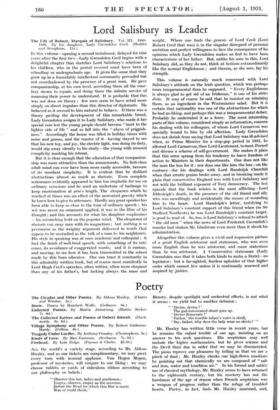Lord Salisbury as Leader Ix this volume—opening a second instalment;
delayed for nine years after the first twn—Lady Gwendolen Cecil begins with a delightful chapter that sketches Lord Salisbury's relations to his children, who in the period covered must have been of schoolboy or undergraduate age. It gives the sense that they grew up in a formidably intellectual community pervaded but not overshadowed by the presence of a great man. He gave companionship, at his own level, according them all the cour- tesy shown to equals, and doing them the infinite service of assuming their power to understand. It is probable that this was not done on theory ; few men seem to have acted more simply on direct impulses than this director of diplomats. He behaved as it seemed to him natural to behave. If there was a theory guiding the development of this remarkable brood, Lady Gwendolen assigns it to Lady Salisbury, who made it her special care lest the young people should become "inert to the lighter side of life " and so fall into the " abyss of priggish- ness." Accordingly the house was filled in holiday times with noise and games, and the master of it—having stayed to see that his new toy, and joy, the electric light, was doing its duty, would slip away silently to his study—the young with amused complicity masking his retreat.
But it is clear enough that the education of that companion- ship was more attractive than the amusements. No first-class adult mind can ever have been more easily accessible, because of its mordant simplicity. It is evident that he disliked abstractions almost as much as rhetoric. Even complete seriousness evidently appeared to him too emphatic for use on ordinary occasions and he used an undertone of badinage to keep emotionalism at arm's length. The eloquence which he reached at times was an effect of the unwonted gravity which he knew how to give to utterance. Hardly any great speaker has been able to keep so close to the tone of ordinary speech ; his wit was never an ornament applied, it was in the fibre of his thought ; and this accounts for what his daughter emphasizes —his astonishing hold on the popular mind. The eloquence of rhetoric can sway men with its magnetism ; but nothing is so persuasive as the weighty argument delivered in words that appear to be unstudied as the talk of a man to his neighbours. His style in speaking was at once academic and colloquial ; it had the finish of well-bred speech, with something of its reti- cence, its avoidance of exaggerated words ; and it is curious, and moving, to see how it has been transmitted in the school made by this born educator. One can trace it constantly in this admirably written hook, but of course most manifestly in Lord Hugh Cecil's speeches, often wittier, often more eloquent than any of his father's, but lacking always the mass and weight. Where one finds the genesis of Lord Cecil (Lord Robert Cecil that was) is in the singular disregard of personal ambition and perfect willingness to face the consequence of his opinions which Lady Gwendolen makes us feel to have been characteristic of her father. But, unlike his sons in this, Lord Salisbury did, as they do not, think at bottom extraordinarily like the normal Englishman ; and therein, as she sees, lay his strength.
This volume is naturally much concerned with Lord Salisbury's attitude on the Irish question, which was perhaps more temperamental than he supposed. " Every Englishman is always glad to get rid of an Irishman," is one of his obiter dicta. It may of course be said that he insisted on retaining them, as an ingredient in the Westminster salad. But it is certain that nationality was one of the abstractions for which he had no liking, and perhaps this was a temperamental defect. Probably he underrated it as a force. The most interesting parts of this volume, considered simply as information, concern his dealing with his colleagues, of whom Lord Carnarvon was specially bound to him by old affection. Lady Gwendolen does not shrink from saying that Lord Salisbury was ill-advised when, as Prime Minister for a stop-gap period in 1885, he allowed Lord Carnarvon, then Lord-Lieutenant, to meet Parnell and discuss a scheme of self-government. She makes it plain that this error sprang from his tendency to leave freedom of action to Ministers in their departments. One does not like the man the less for it : nor does one like him the less—on the contrary—for his dealings with Lord Randolph Churchill when that erratic genius broke away, and in breaking made it plain that conservative England was with Lord Salisbury and not with the brilliant exponent of Tory democracy. The last episode that the book relates is the most afflicting—Lord Iddesleigh's death, in the presence of the old friend and ally who was unwillingly and accidentally the means of wounding him to the heart. Lord Randolph's letter, testifying to Lord Salisbury's constant support of this friend when (as Sir Stafford Northcote) he was Lord Randolph's constant target, is good to read of. So, too, is Lord Salisbury's refusal to attack " the old man " when the news of Lord Frederick Cavendish's murder had shaken Mr. Gladstone even more than it shook his administration.
Altogether this volume gives a vivid and impressive picture of a great English aristocrat and statesman, who was even more English than he was aristocrat, and more statesman than he was aristocrat. A Conservative statesman (Lady Gwendolen sees that it takes both kinds to make a State)—no legislator; but a far-sighted, fearless upholder of that higher order which cannot live unless it is continually renewed and inspired by justice.


































 Previous page
Previous page